GOP support not universal for Gov. Bill Lee's statewide voucher plan: 'It concerns me’
- Oops!Something went wrong.Please try again later.
- Oops!Something went wrong.Please try again later.
As funding and accountability details emerge on Gov. Bill Lee’s proposed statewide universal school voucher program, the governor is likely to face some opposition from members of his own party, as they raise questions and concerns over the plan.
While members of Tennessee’s GOP supermajority have voted in lockstep on many controversial issues, support for the governor's Education Freedom Scholarships Act among members of the GOP caucus is far from universal – and some have more questions than answers about the Republican governor’s top legislative priority for next year.
“It concerns me,” Rep. Sam Whitson, R-Franklin, told The Tennessean in an interview. “As a fiscal conservative, my question would be what's the revenue source for this? And do they really know the true costs of what this will be? I can see this thing just spiraling out of control much like what they did when they first instituted TennCare. They have come back and fixed it.”
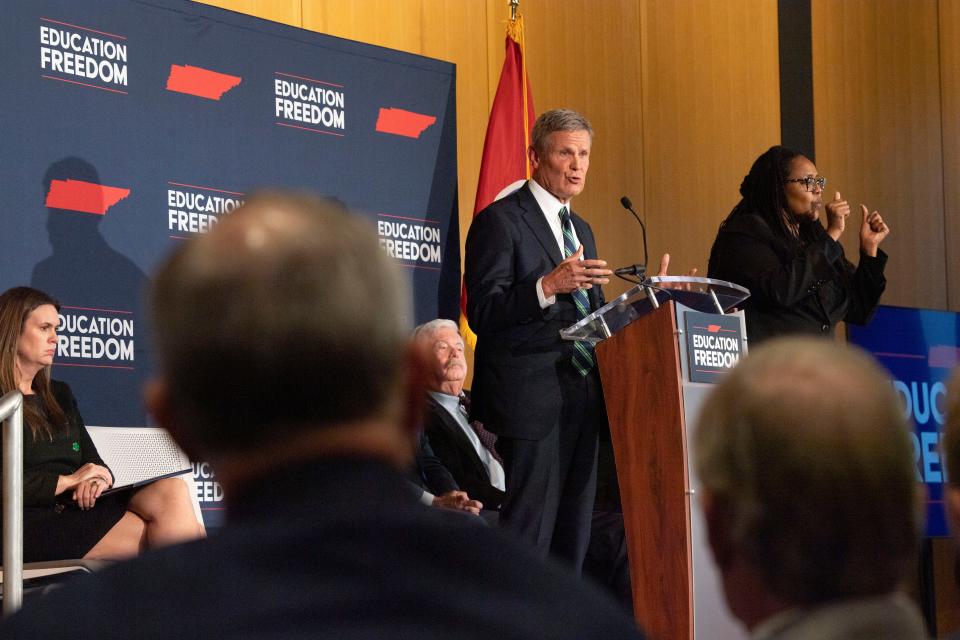
Whitson said there is little evidence that the state’s existing school choice program, the Education Savings Account initiative, is successful.
Parents of of students participating in the program have largely touted it and its benefits for their children. But state test results from the first year of the ESA program indicate that participants performed worse than their public school peers in Davidson and Shelby Counties on state-required testing. Administrators for participating schools say that poor performance could be due to the demographic of students that the program is designed to reach, or to school staff's lack of experience administering the tests.
More: Families tout voucher success as test scores spark doubt and critics worry over expansion
Whitson is concerned that without imposing accountability measures and testing requirements the state requires for public schools, Tennessee will be unable to exercise appropriate oversight over non-public schools in the governor's proposed statewide program.
“They’re even talking about [including] home schoolers and unchartered schools,” he said. “They should be under the same standards and requirements as the public school so we can track achievement and progress.”

The program could also disproportionately impact disabled students, Whitson said, due to additional costs schools undertake to adequately serve that population. And, he’s concerned about the outside money and influence already being brought to bear from pro-school choice lobbying groups.
“In Williamson County, we have the best school system in the state, and I just worry that this would undermine this great system we have here in the future,” Whitson said.
Sen. Richard Briggs, R-Knoxville, who voted against ESAs in 2019, still has concerns about state dollars going to private institutions.
"I would rather bring our poor-performing schools to perform better," Briggs told the Knoxville News Sentinel.
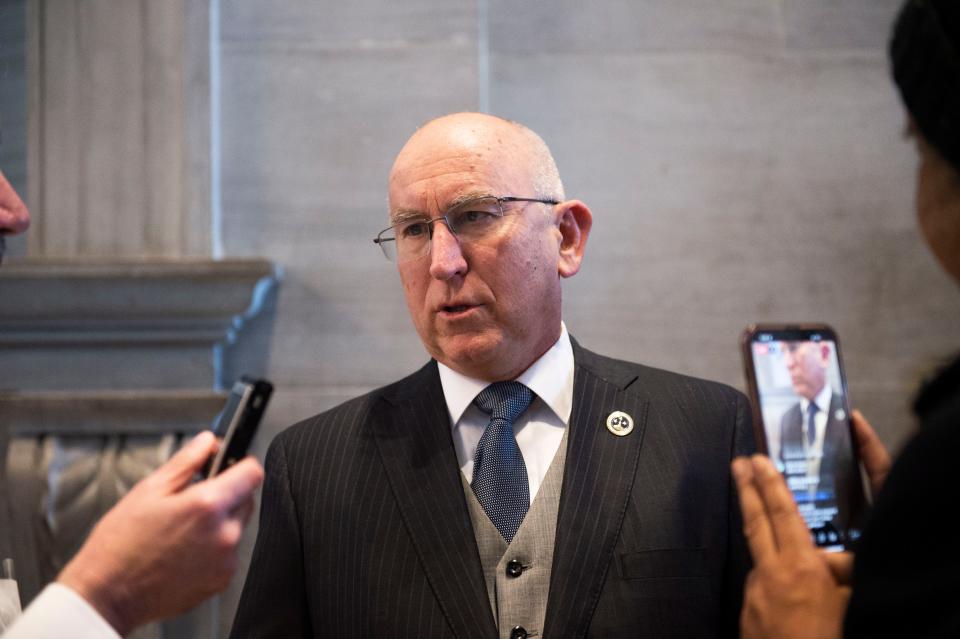
Briggs is concerned about what types of private schools could receive state funds.
"We have an Islamic school in Knoxville. Some of the young children that will want vouchers may go there," Briggs said. "Are we using taxpayer money to send kids to Islamic schools? ...We shouldn't have taxpayer money funneling to Islamic education."
He's also concerned about lack of state oversight over private institutions, which could receive taxpayer dollars through the program.
"We have talked about banning books that are not age appropriate," Briggs said. "We don't allow flying of the rainbow flag ... we don't discuss children that may be confused about their gender. Are those same rules going to apply to private schools? Are we going to have any oversight?"
Lee's 2019 proposal to establish Education Savings Accounts was highly controversial, and passed by only one vote in the House of Representatives after then-Speaker Glen Casada, R-Franklin, held the vote board open for more 40 minutes. Rep. Jason Zachary, R-Knoxville, cast the deciding vote, later saying he only changed his vote to support the ESA law with assurances that Knox County would not be included in the pilot program.
While key lawmakers have recently indicated movement to expand school options statewide next year, at least 14 Republican House members, and eight Republican senators who opposed the 2019 legislation remain in office. While some have indicated they support the governor's proposal, many have yet to publicly take a position.
Zachary is waiting to see more details of the governor's bill before deciding whether to support. Zachary told The Tennessean that he is generally supportive of school choice policies.
Senate Republican Caucus Chair Ken Yager, R-Kingston, is one of the few members of GOP leadership who has yet to offer support. According to Senate GOP Caucus spokesperson Molly Gormley, Yager has not yet seen details of the governor’s proposal and is not ready to comment.
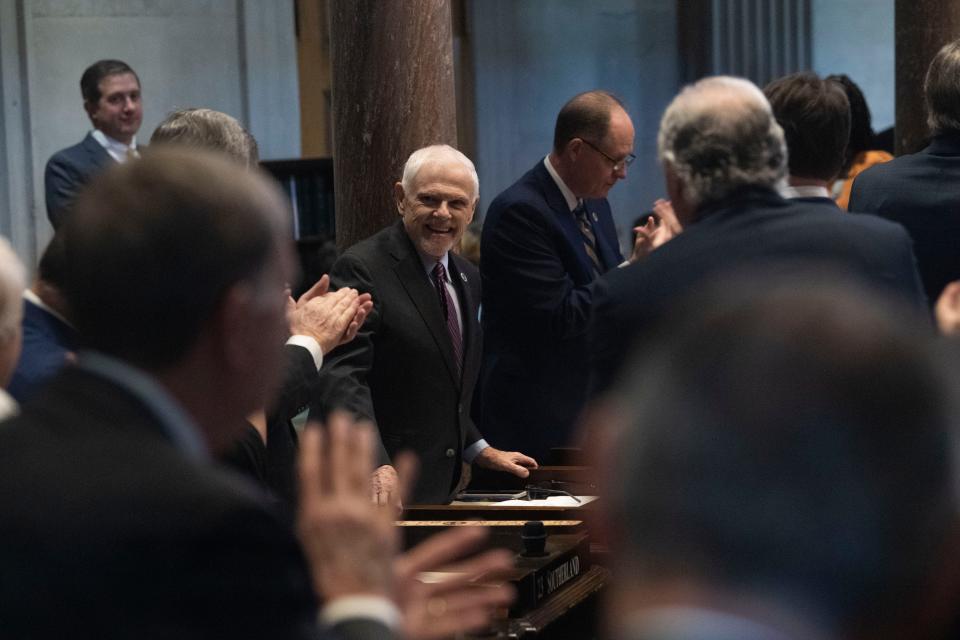
Rep. Jody Barrett, R-Dickson, who was not yet in office during the 2019 vote, said he is also undecided, and awaiting further details from the governor’s office.
"I am certain this initiative will be heavily debated and the final product, if anything is passed, will look different than the original proposal released later today," Barrett wrote in a social media post.
Scholarships to be paid from general fund
No bill language has been filed yet in either chamber, so while many questions remain unanswered, further details on funding and accountability measures for the program are beginning to emerge from the governor’s office.
According to Lee spokesperson Elizabeth Johnson, funding for the Education Freedom Scholarships will be allocated from the state general fund. Lee said last week the state would establish a scholarship fund separate from the state's TISA K-12 funding formula.
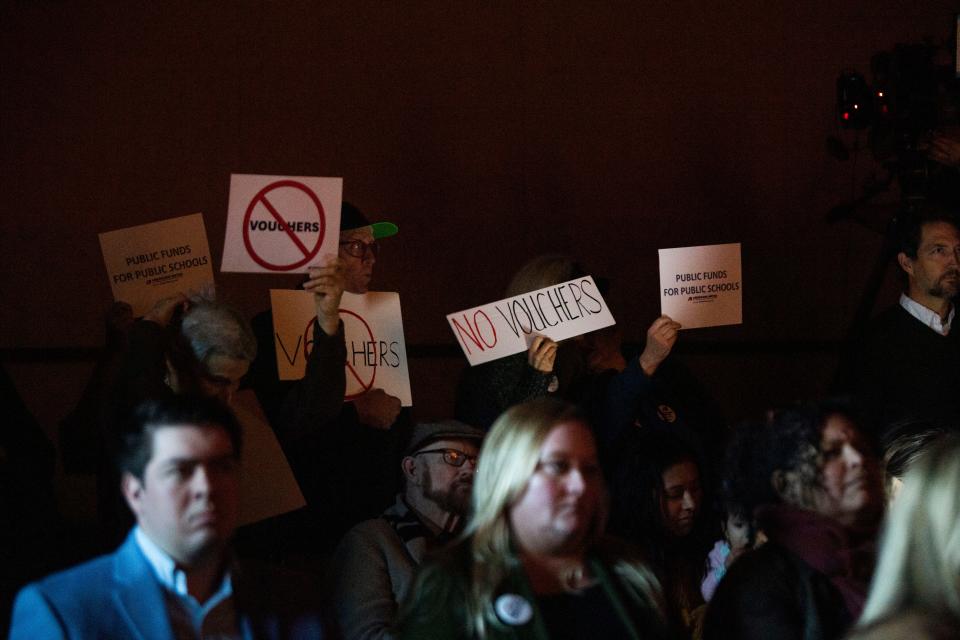
The governor’s office confirmed the scholarships alone could cost the state up to $141.5 million in the first year, but final costs, including administrative costs, remain unknown.
In future years, it’s unclear what the program would cost the state. Johnson said the governor’s intent is for the program to “ramp up” – even beyond the initial 20,000 slots funded for 2024-25 – if demand is there. If demand outpaces funding for the program in subsequent years, the state would prioritize at-risk and low-income students.
But while 20,000 scholarships is an initial target in the first year, there is no limit to the number that could ultimately granted with state dollars.
“This is about how parents should have choices no matter their ZIP codes," Johnson told The Tennessean.
If demand for the program grows beyond the 20,000 initially funded, the governor would work with the legislature to target and fund the number of seats that need to be available, Johnson said.
“The goal is that every single student in the state will be able to access this program if they want it,” she said. “Gov. Lee looks forward to working with the General Assembly to determine how much additional funding should be added in year two and beyond, growing the program in a fiscally responsible way."
Lee’s initial proposal will not include testing, accountability measures
No accountability measures – such as TCAP testing requirements, A-F grading for private schools, or third grade retention requirements – are included in the governor’s proposed bill so far, though details are still being hammered out, Johnson told The Tennessean.
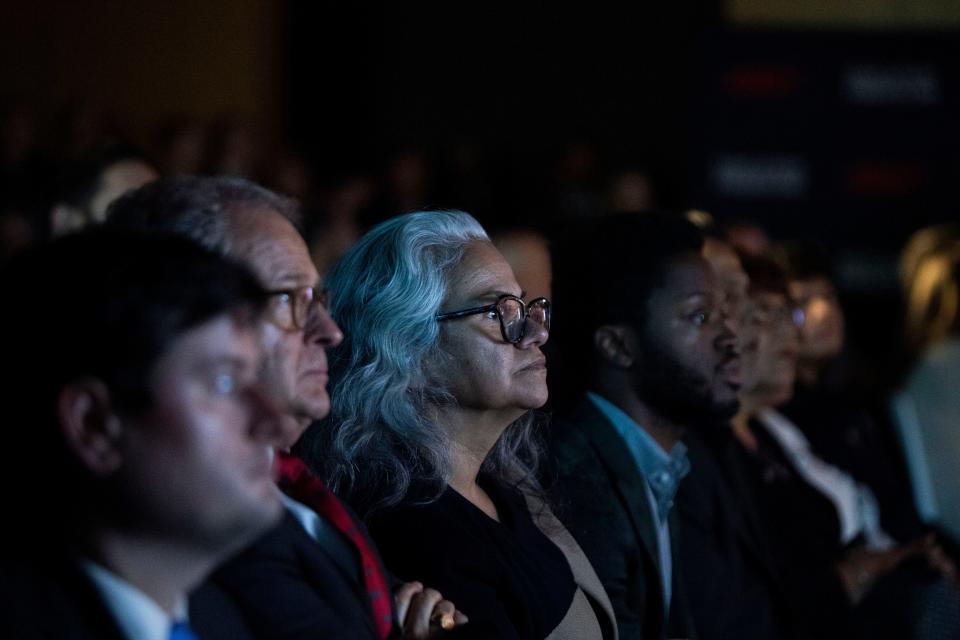
“In our proposal right now, we believe that parents are the best form of accountability. They have their child’s best interests in mind and they will hold the schools accountable,” Johnson said. "Parents make the best decisions for their child and know when a school is right or wrong."
Johnson noted many private schools use national norm-referenced tests to measure performance. But private schools are not required to report test scores to the state for accountability purposes.
In addition, the proposal makes unaccredited private schools eligible to accept the Education Freedom Scholarships without any testing, achievement or accreditation requirements. By contrast, not every private school is eligible to participate in the current ESA program. So it's unclear how the state could track whether schools funded through the program are helping students achieve academic goals. Private schools also aren't subject to the same A-F letter grading system as public schools.
Still, the governor's office insists there is no intention to fund dishonest or low-quality schools.
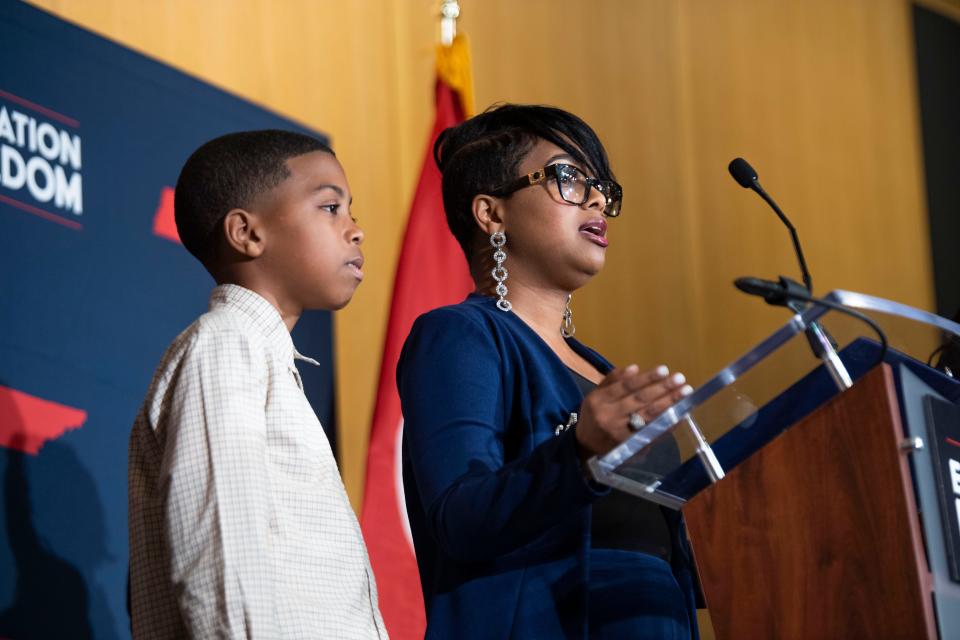
The state maintains aggressive accountability measures for public schools and public school students, and imposes strict accountability mechanisms for other state-funded programs – including the state’s Medicaid program, TennCare, and other social aid programs – to ensure dollars are used in compliance with state and federal law.
While testing and other accountability requirements do not appear to be included in the governor’s proposal, they could be added through the legislative process, or by state agency rulemaking processes once signed into law.
Republicans who opposed Lee’s 2019 voucher program flip
Of the 22 Republican lawmakers still in office who opposed Lee’s 2019 bill to establish ESAs, several have already expressed strong support for his statewide universal school voucher proposal.
Most noteworthy is House Speaker Cameron Sexton, R-Crossville, who voted against the Education Savings Accounts program in 2019, and told reporters in January that he is "not a proponent of ESAs," instead favoring the charter school system.
But Sexton spoke alongside the governor as Lee unveiled his Education Freedom Scholarship accounts last week, emphasizing that funding for school vouchers would be independent from the TISA funding structure.
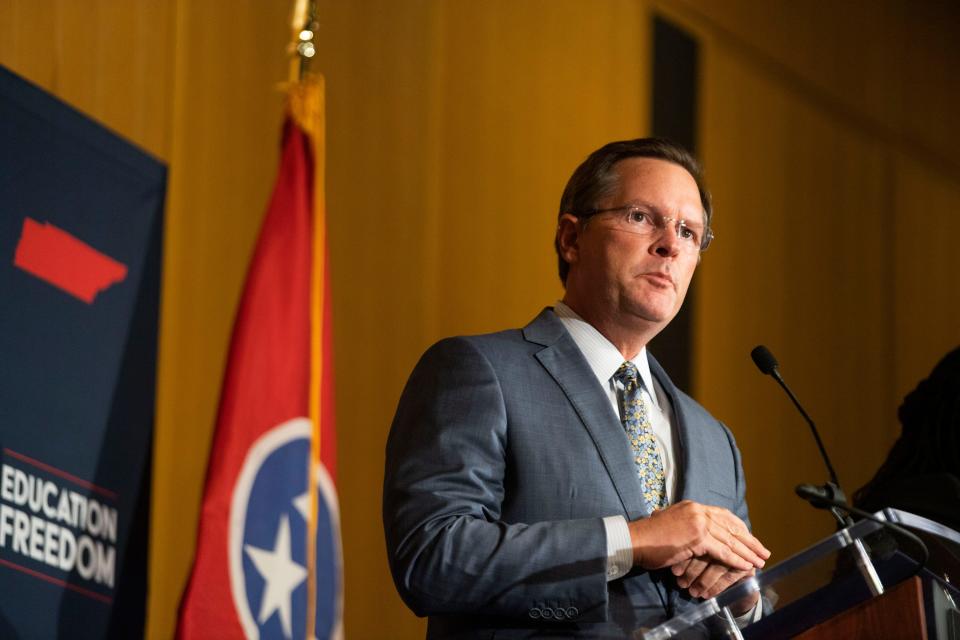
“We all agree that every child should have an opportunity for a quality education that meets their needs, and I strongly believe the ultimate decision should be made by parents, not government bureaucrats," Sexton said in a statement Tuesday. "In the future in Tennessee, students and parents will be in control of their education success, without the government limiting their opportunities."
Also, Senate Majority Leader Jack Johnson, R-Franklin, who voted for the ESA program in 2019 while pledging that vouchers would not be coming to Williamson County, is now supporting expansion of a voucher program into his district.
State Rep. Ron Gant, R-Piperton, who voted against the ESA program in 2019, said his priority is “providing a quality education to every child in Tennessee.”
“At this time, I am leaning heavily towards supporting the governor’s plan since it would remove income restrictions and make school choice truly accessible to all families in our state over time, not just a select few,” Gant told The Tennessean in a statement. “I will need to learn more about the specific details of the legislation and understand its effects before I make a final decision.”
Gant also noted that he wants to ensure that home school students and private schools “are protected from any unnecessary governmental regulations that would be detrimental or harmful to them in any way.”
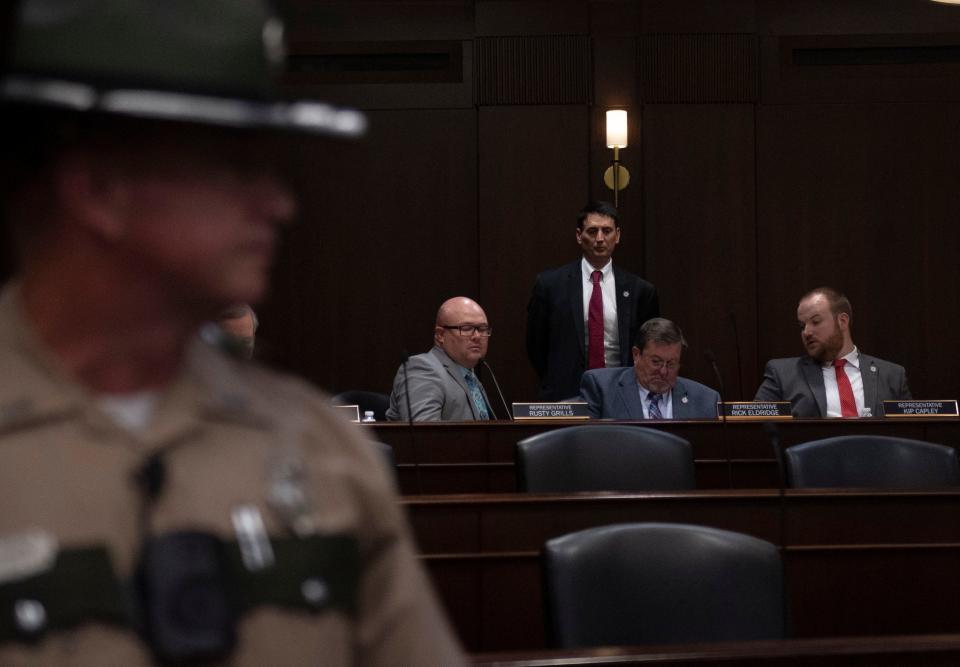
Others remain undecided. House Civil Justice Committee Chairman Lowell Russell, R-Vonore, voted against the ESAs in 2019, but supported expanding them to Hamilton County earlier this year. Russell told The Tennessean that he has not yet decided whether to support Lee’s statewide proposal.
Sen. Becky Massey, R-Knoxville, who opposed ESAs in 2019 is also undecided.
"I'll be doing my due diligence," Massey told the Knoxville News Sentinel. "In the past, I've not voted for vouchers. I've not necessarily voted against them. But this one, it may have a little bit different flavor to it. But I'm waiting to see what the bill language looks like."
House Republicans who opposed ESAs in 2019: Rep. Rush Bricken, R-Tullahoma, Rep. Dale Carr, R-Sevier County, Rep. Mark Cochran, R-Englewood, Rep. Ron Gant, R-Piperton, Rep. Kirk Haston, R-Lobelville, Rep. David Hawk, R-Greeneville, Rep. Gary Hicks, R-Rogersville, Rep. John Holsclaw, R-Elizabethton, Rep. Kelly Keisling, R-Byrdstown, Rep. Lowell Russell, R-Vonore, Rep. Cameron Sexton, R-Crossville, Rep. Ron Travis, R-Dayton, Rep. Kevin Vaughan, R-Collierville, Rep. Sam Whitson, R-Franklin
Senate Republicans who opposed ESAs in 2019: Sen. Paul Bailey, R-Sparta, Sen. Richard Briggs, R-Knoxville, Sen. Todd Gardenhire, R-Chattanooga, Sen. Becky Duncan Massey, R-Knoxville, Sen. Frank Niceley, R-Strawberry Plains, Sen. Steve Southerland, R-Morristown, Sen. Art Swann, R-Maryville, Sen. Ken Yager, R-Kingston.
Support among key committee leaders is strong
Committee leadership – particularly on House and Senate committees on education and finance – will play a key role in passage of the proposal. Most are already in support.
House Education Committee Chair Mark White, R-Germantown, sat on the front row as Lee made his proposal last week.
“The freedom for parents to choose where their child goes to school is fundamental in ensuring the success of our students,” White said.
Senate Education Committee Chair Jon Lundberg, R-Bristol, was traveling out of state during the announcement, or he would have been there, a spokesperson said.
“I fully support school choice and look forward to championing Governor Lee’s proposal in the legislature next year,” Lundberg said in a statement to The Tennessean.
Senate Finance Committee Chair Bo Watson, R-Hixson, was unable to attend due to obligations in his district. While he said he supports school choice, "responsible fiscal management will remain a top priority" while assessing new spending. Watson has repeatedly cautioned colleagues to be conscious of stagnating state revenues as they considered new spending.
“In general, I support educational choice for families, but I have not seen the specifics of Governor Lee’s proposal,” Watson said in a statement to The Tennessean. “Without the details, I don’t know the financial implications of this new proposal."
House Finance Chair State Rep. Patsy Hazlewood, R-Signal Mountain, said that she has “always supported giving parents more options when it comes to their child’s education.”
“Every student deserves to have access to a quality school that best meets their individual learning needs. Even with revenue projections slowing, Tennessee remains in a strong financial position that will allow us to continue to make strategic investments in key areas throughout our state,” Hazlewood said. “I look forward to learning more details about Gov. Lee’s proposal.”
Areena Arora in Knoxville contributed to this report.
Vivian Jones covers state politics and government for The Tennessean. Reach her at vjones@tennessean.com.
This article originally appeared on Nashville Tennessean: TN school vouchers: Republican support for Lee's plan not universal

